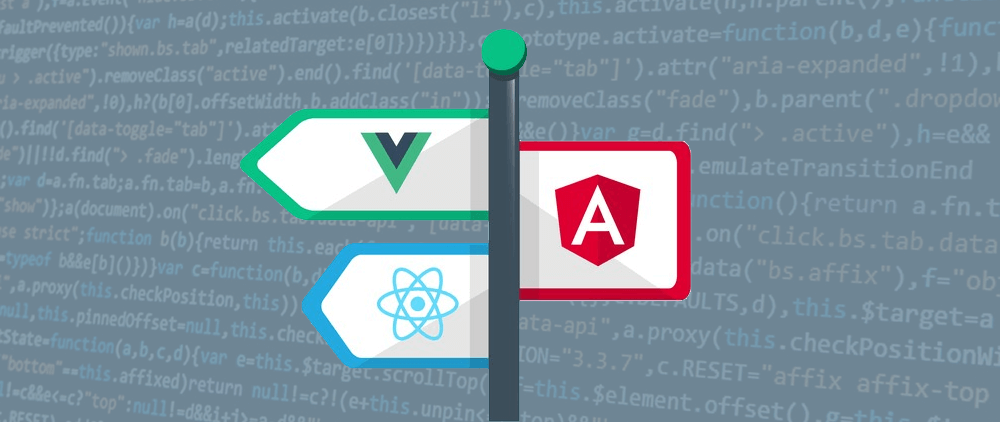ReactJS vs AngularJS vs VueJS – An extensive comparison

Let’s do a head to head comparison between these 3 frameworks.
The simplicity of programming and development time
 Now when you compare the three frameworks about the simplicity of coding and the average length of code lines developers need to write, each framework again differs a lot from one another.
Now when you compare the three frameworks about the simplicity of coding and the average length of code lines developers need to write, each framework again differs a lot from one another.
AngularJS seems to be more complex and a little confusing because of its syntax. This also puts it behind the other two frameworks in terms of development time.
ReactJS is fairly simple and straightforward for the developers to understand and start with. But the real difficulty is that it takes a considerable time to set up ReactJS project.
VueJS in comparison to the two others is very easy to set up and faster to start a project because of its MVC model and the feature of data binding.
Size and loading time
Size of a framework is crucial to ensure faster loading time. In this respect too, there are considerable differences among the 3 frameworks.
AngularJS is heavier than other two and naturally takes longer to load.
ReactJS in respect of size comes somewhere in between the two options, respectively AngularJS and VueJS.
VueJS being very small sized framework contains almost everything developers need. Naturally, it is the best framework for faster loading into mobile devices.

Challenges in respect of human resource and recruitment
For developer companies often finding fresh JavaScript developer talents is a challenge. In case your firm already has HTML developers and you want to go with their existing JavaScript expertise, choosing AngularJS and VueJS will be a better option as ReactJS requires having more JavaScript expertise than these two languages.
The angular framework may have a slightly higher learning curve but once a developer learns any of the Angular languages he can quickly familiarise with different project requirements and conventions. But while working with ReactJS, the developer often needs higher time in getting used to the decisions concerning architecture and project setup. Angular is particularly good for all developers who have to dislike for JavaScript and most are familiar with object-oriented languages.

Comparison of components
All these frameworks that we are presently discussion have one thing in common that they are component-based. Because if being component based they offer a high level of reusability across development projects. A component used in one project can be utilised with other data sets.
Now coming to components, AngularJS components radically differ from the other two frameworks because it uses a different language called Typescript which differs a lot from usual JavaScript languages. This is why both React and Vue works really good for handling very small and stateless functions that just by receiving an input simply delivers elements as the output. Typescript being not a common language for JavaScript developers worldwide actually adds a lot of learning curve to the AngularJS framework.
Coming to templates, ReactJS is unique in intermixing the UI templates with JavaScript logic. ReactJS allow you to build components with JavaScript logic and use them as components that are completely reusable, compose-ready and unit-testable.
The AngularJS, on the other hand, offers templates that are built by enhancing the HTML with special Angular language. This is why React is more developer friendly as it just needs knowledge of JavaScript. In contrast, with AngularJS you need to use Angular-specific syntax. Vue, on the other hand, offers single-file components which are quite handy as you get all packed including syntax highlighting, CSS support and also the easy support of preprocessors like SCSS.

Access to all-equipped library
Angular strongly prescribes the way an app should be structured and comes with ready to use functionality. This is why Angular is more a framework than a library. With AngularJS you can just readily start building the app. But this from the seasoned developer’s point of view is a big limitation as well. The framework is seriously devoid of an equipped as well as flexible library.

In complete contrast, robust and flexible libraries are the key strengths of both React and Vue. The libraries of both the framework are capable to be paired with all types of packages. But this huge flexibility also requires handling the programming tasks with a lot of responsibility. Particularly with ReactJS, you have no guiding rules at your disposal. You need to decide about the architecture in every project and so, you are always vulnerable to mistakes.
Vue appears as the cleanest and lightweight among these 3 frameworks. It offers a balanced approach comprising what it comes packed with and the things developers need to do while using it. Apart from being very flexible it keeps your programming efficient and keeps DOM related difficulties to a minimum.
Testing
To test ReactJS code Facebook uses Jest and there is also Mocha . There are other effective frameworks for testing ReactJS code too. React comes with very well grounded testing mechanism to help you evaluate your finished work very easily.
AngularJS also comes equipped with the good testing mechanism and there are popular testing frameworks like Jasmine in Angular 2 which easily shows various ways to write tests and assertions.
When it comes to VueJS, the framework really lacks a proper testing guideline. The framework works well with Karma and also with Jest.

Pros and cons of ReactJS, AngularJS and VueJS
Let us now have a brief look at the key pros and cons of all three frameworks mentioned that we explained.
Pros and cons of React JS
Pros
- Low learning curve and easy to use: React is very easy to use with detailed documentation, tutorials and lots of resources for the developers. Anyone coming from a JavaScript background can readily use ReactJS.
- Reusability of components: ReactJS his component based and offer a high degree of code reusability. Thanks to this developers can maintain a consistent look and feel of the app throughout a project.
- Virtual DOM: ReactJS comes with virtual DOM that prevents performance issues caused by DOM manipulation.
- A whole range of developer tools: ReactJS makes it further easier with a whole array of ReactJS developer tools. You have every kind of tool of your preference for both debugging and designing.
Cons
- Navigation is not handy: React Native lacks those components that offer seamless and user optimised navigation.
- The absence of Custom Modules for building UX: For user optimised app user experience having custom modules are the order of the day but you don’t have any with ReactJS.
- Native implementation still needs native developers: Though ReactJS comes with few modules for implementing native features, accessing several device functions and sensors you still require the support of native developers.
- You are dependent on the Facebook license: Though Facebook makes an available lot of resources, you are still dependant on the Facebook license.
Pros and cons of AngularJS
Pros
- Automate DOM Manipulation and Data binding: AngularJS comes equipped with two way data binding and automated DOM manipulation.
- Testing and Maintenance: AngularJS is great for debugging as it comes loaded with advanced refactoring and debugging properties. Testing tools like Karna and Protractor and the availability of dependency injections make life further easier for the AngularJS developers.
- Separation of Concerns: Thanks to the MVW model AngularJS is great for separation of concerns and cleaner faster development.
- Deep Linking module: For single page app development AngularJS offers a deep linking module that just helps the way Ajax is used.
- Tools and Filters: You can also combine AngularJS with several other tools and filters. For example, you can work with the WordPress API. You can get the JSON files of your WordPress website data and by putting them through AngularJS can deliver a high-speed frontend experience.
Cons
- Steep Learning Curve: Compared to other two frameworks AngularJS has a slightly higher learning curve. It looks intimidating for a JavaScript beginner but not as tough as it has been hyped over.
- Insufficient Documentation: According to many developers AngularJS doesn’t have sufficient documentation covering every detail aspects.
- Debugging difficulties: Debugging difficulties make a big problem with AngularJS framework.
Pros and cons of Vue JS
Pros
- Smaller in size: VueJS compared to other two frameworks is really small and lightweight. It just takes 18kb space with a zip file. In spite of such small size, it is capable to do better than many bulky frameworks.
- Easy for developers: Offering developers capability to build large-scale templates it saves a lot of time and makes the development easier.
- Easy for integrating components: whether you want to develop a single page app from the scratch or want to integrate components into an existing app, VueJS makes integration extremely easier.
- Very well written and detailed documentation: Vue.js offers a very comprehensive and detailed documentation to help beginners writing an app easily.
- Flexibility: VueJS is very flexible for building all sorts of apps ranging from simple browser apps to highly sophisticated and feature-rich apps.
- Two-way binding: Vue.js allows two-way data binding to boost responsiveness of apps and capability to work with a variety of components.
Cons
- A limited developer community: Without being as popular as the React or Angular. Vue.js is backed by a closed and smaller community of developers.
- Language constraint: From the creator to the majority of the developers, most of them belong to non-English speaking community and that is one big constraint for VueJS developers to access community help.
- The overburden of options: Being too flexible it comes with too many options that at times it felt like a burden, especially in large projects involving too many developers.
Conclusion
JavaScript family is really bursting and booming with too many great frameworks allowing a whole array of sophisticated development options to the modern web app developers. Together this tremendous multiplicity, variety and flexibility create a huge value for the developers of today and tomorrow. In this respect, the differences among the 3 frameworks we mentioned offer JavaScript developers some commendable choices for a variety of projects.
We’re honored to mention that our efforts have been recognized by renowned B2B review and research platforms such as GoodFirms, Clutch, MirrorView, and many more.
Similar Posts

Top 5 Startup Project Management Methodologies in 2024
How can startups navigate the whirlwind of innovation and competition, ensuring their projects stay on course amidst the ever-changing tides of technology and business landscapes? In the quest for success, the answer lies in effective project management methodologies—strategies that offer the agility, adaptability, and precision necessary to thrive in the fast-paced world of entrepreneurship. As […]...

Agile vs Waterfall software development Methodology
Any software development company has to decide about the methodology suited for their projects. There are two mighty and time tested choices, respectively as waterfall and agile software development methodology. To be precise, both are far from opposed to each other as antagonist opposites. But these two methodologies clearly shows the evolution of the software […]...

Exploring the Power of PHP: Use Cases and Best Practices
Are you a developer seeking a powerful and versatile solution for your web development projects? Have you been pondering over the perfect language to breathe life into your innovative ideas and turn them into reality? Look no further, as we present to you the answer to your web development quest: PHP – a dynamic scripting […]...









